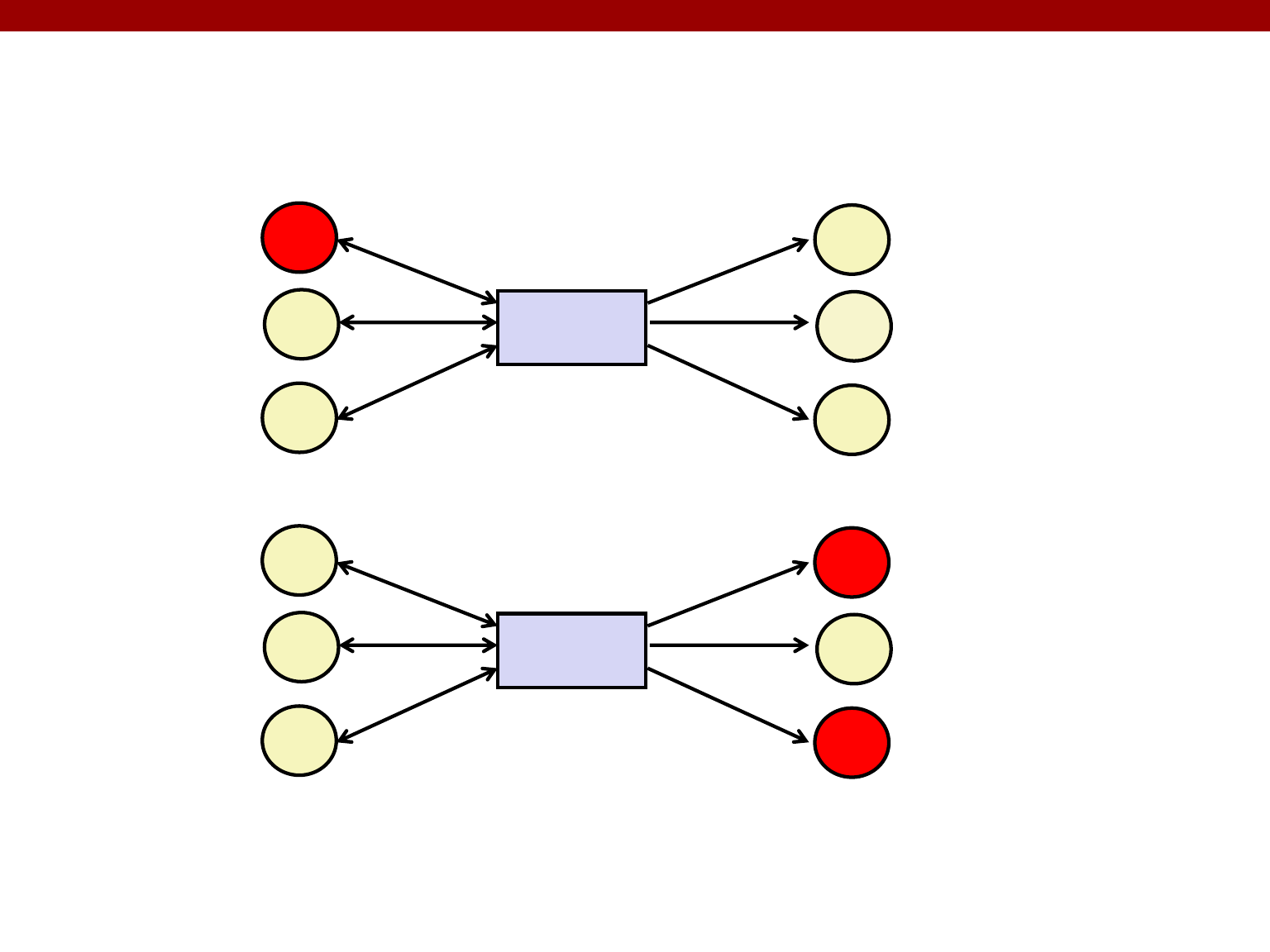
Carnegie Mellon
1
14-513
18-613

Carnegie Mellon
2
Synchronization: Advanced
15-213/18-213/14-513/15-513/18-613:
Introduction to Computer Systems
26
th
Lecture, Nov. 21, 2019

Carnegie Mellon
3
Reminder: Semaphores
¢ Semaphore: non-negative global integer synchronization
variable
¢ Manipulated by P and V operations:
§ P(s): [ while (s == 0); s--; ]
§ Dutch for "Proberen" (test)
§ V(s): [ s++; ]
§ Dutch for "Verhogen" (increment)
¢ OS kernel guarantees that operations between brackets [ ] are
executed atomically
§ Only one P or V operation at a time can modify s.
§ When while loop in P terminates, only that P can decrement s
¢ Semaphore invariant: (s >= 0)

Carnegie Mellon
4
Review: Using semaphores to protect shared
resources via mutual exclusion
¢ Basic idea:
§ Associate a unique semaphore mutex, initially 1, with each shared
variable (or related set of shared variables)
§ Surround each access to the shared variable(s) with P(mutex) and
V(mutex) operations
mutex = 1
P(mutex)
cnt++
V(mutex)

Carnegie Mellon
5
Review: Using Lock for Mutual Exclusion
¢ Basic idea:
§ Mutex is special case of semaphore that only has value 0 (locked) or 1
(unlocked)
§ Lock( m ) : [ while (m == 0); m=0; ]
§ Unlock(m): [ m=1]
¢ ~2x faster than using semaphore for this purpose
§ And, more clearly indicates programmer’s intention
mutex = 1
lock(mutex)
cnt++
unlock(mutex)

Carnegie Mellon
6
Review: Producer-Consumer Problem
¢ Common synchronization pattern:
§ Producer waits for empty slot, inserts item in buffer, and notifies consumer
§ Consumer waits for item, removes it from buffer, and notifies producer
¢ Examples
§ Multimedia processing:
§ Producer creates video frames, consumer renders them
§ Event-driven graphical user interfaces
§ Producer detects mouse clicks, mouse movements, and keyboard hits
and inserts corresponding events in buffer
§ Consumer retrieves events from buffer and paints the display
producer
thread
shared
buffer
consumer
thread

Carnegie Mellon
7
Review: Using Semaphores to
Coordinate Access to Shared Resources
¢ Basic idea: Thread uses a semaphore operation to notify
another thread that some condition has become true
§ Use counting semaphores to keep track of resource state.
§ Use binary semaphores to notify other threads.
¢ The Producer-Consumer Problem
§ Mediating interactions between processes that generate
information and that then make use of that information
§ Single entry buffer implemented with two binary semaphores
§ One to control access by producer(s)
§ One to control access by consumer(s)
§ N-entry implemented with semaphores + circular buffer

Carnegie Mellon
8
Today
¢ Using semaphores to schedule shared resources
§ Readers-writers problem
¢ Other concurrency issues
§ Thread safety
§ Races
§ Deadlocks
§ Interactions between threads and signal handling

Carnegie Mellon
9
Readers-Writers Problem
¢ Problem statement:
§ Reader threads only read the object
§ Writer threads modify the object (read/write access)
§ Writers must have exclusive access to the object
§ Unlimited number of readers can access the object
¢ Occurs frequently in real systems, e.g.,
§ Online airline reservation system
§ Multithreaded caching Web proxy
W
1
W
3
W
2
R
1
R
3
R
2
Read/
Write
Access
Read-only
Access

Carnegie Mellon
10
Readers/Writers Examples
W
1
W
3
W
2
R
1
R
3
R
2
W
1
W
3
W
2
R
1
R
3
R
2

Carnegie Mellon
11
Variants of Readers-Writers
¢ First readers-writers problem (favors readers)
§ No reader should be kept waiting unless a writer has already been
granted permission to use the object.
§ A reader that arrives after a waiting writer gets priority over the
writer.
¢ Second readers-writers problem (favors writers)
§ Once a writer is ready to write, it performs its write as soon as
possible
§ A reader that arrives after a writer must wait, even if the writer is
also waiting.
¢ Starvation (where a thread waits indefinitely) is possible
in both cases.

Carnegie Mellon
12
Solution to First Readers-Writers Problem
int readcnt; /* Initially 0 */
sem_t mutex, w; /* Both initially 1 */
void reader(void)
{
while (1) {
P(&mutex);
readcnt++;
if (readcnt == 1) /* First in */
P(&w);
V(&mutex);
/* Reading happens here */
P(&mutex);
readcnt--;
if (readcnt == 0) /* Last out */
V(&w);
V(&mutex);
}
}
void writer(void)
{
while (1) {
P(&w);
/* Writing here */
V(&w);
}
}
Readers: Writers:
rw1.c

Carnegie Mellon
13
Readers/Writers Examples
W
1
W
3
W
2
R
1
R
3
R
2
W
1
W
3
W
2
R
1
R
3
R
2
w = 0
readcnt = 0
W
1
W
3
W
2
R
1
R
3
R
2
w = 1
readcnt = 0
w = 0
readcnt = 2

Carnegie Mellon
14
Solution to First Readers-Writers Problem
int readcnt; /* Initially 0 */
sem_t mutex, w; /* Both initially 1 */
void reader(void)
{
while (1) {
P(&mutex);
readcnt++;
if (readcnt == 1) /* First in */
P(&w);
V(&mutex);
/* Reading happens here */
P(&mutex);
readcnt--;
if (readcnt == 0) /* Last out */
V(&w);
V(&mutex);
}
}
void writer(void)
{
while (1) {
P(&w);
/* Writing here */
V(&w);
}
}
Readers: Writers:
rw1.c
Arrivals: R1 R2 W1 R3

Carnegie Mellon
15
Solution to First Readers-Writers Problem
int readcnt; /* Initially 0 */
sem_t mutex, w; /* Both initially 1 */
void reader(void)
{
while (1) {
P(&mutex);
readcnt++;
if (readcnt == 1) /* First in */
P(&w);
V(&mutex);
/* Reading happens here */
P(&mutex);
readcnt--;
if (readcnt == 0) /* Last out */
V(&w);
V(&mutex);
}
}
void writer(void)
{
while (1) {
P(&w);
/* Writing here */
V(&w);
}
}
Readers: Writers:
rw1.c
Arrivals: R1 R2 W1 R3
R1
Readcnt == 1
W == 0

Carnegie Mellon
16
Solution to First Readers-Writers Problem
int readcnt; /* Initially 0 */
sem_t mutex, w; /* Both initially 1 */
void reader(void)
{
while (1) {
P(&mutex);
readcnt++;
if (readcnt == 1) /* First in */
P(&w);
V(&mutex);
/* Reading happens here */
P(&mutex);
readcnt--;
if (readcnt == 0) /* Last out */
V(&w);
V(&mutex);
}
}
void writer(void)
{
while (1) {
P(&w);
/* Writing here */
V(&w);
}
}
Readers: Writers:
rw1.c
Arrivals: R1 R2 W1 R3
R1
Readcnt == 2
W == 0
R2

Carnegie Mellon
17
Solution to First Readers-Writers Problem
int readcnt; /* Initially 0 */
sem_t mutex, w; /* Both initially 1 */
void reader(void)
{
while (1) {
P(&mutex);
readcnt++;
if (readcnt == 1) /* First in */
P(&w);
V(&mutex);
/* Reading happens here */
P(&mutex);
readcnt--;
if (readcnt == 0) /* Last out */
V(&w);
V(&mutex);
}
}
void writer(void)
{
while (1) {
P(&w);
/* Writing here */
V(&w);
}
}
Readers: Writers:
rw1.c
Arrivals: R1 R2 W1 R3
R1
Readcnt == 2
W == 0
R2
W1

Carnegie Mellon
18
Solution to First Readers-Writers Problem
int readcnt; /* Initially 0 */
sem_t mutex, w; /* Both initially 1 */
void reader(void)
{
while (1) {
P(&mutex);
readcnt++;
if (readcnt == 1) /* First in */
P(&w);
V(&mutex);
/* Reading happens here */
P(&mutex);
readcnt--;
if (readcnt == 0) /* Last out */
V(&w);
V(&mutex);
}
}
void writer(void)
{
while (1) {
P(&w);
/* Writing here */
V(&w);
}
}
Readers: Writers:
rw1.c
Arrivals: R1 R2 W1 R3
R1
Readcnt == 1
W == 0
R2
W1

Carnegie Mellon
19
Solution to First Readers-Writers Problem
int readcnt; /* Initially 0 */
sem_t mutex, w; /* Both initially 1 */
void reader(void)
{
while (1) {
P(&mutex);
readcnt++;
if (readcnt == 1) /* First in */
P(&w);
V(&mutex);
/* Reading happens here */
P(&mutex);
readcnt--;
if (readcnt == 0) /* Last out */
V(&w);
V(&mutex);
}
}
void writer(void)
{
while (1) {
P(&w);
/* Writing here */
V(&w);
}
}
Readers: Writers:
rw1.c
Arrivals: R1 R2 W1 R3
R1
Readcnt == 2
W == 0
R2
W1
R3

Carnegie Mellon
20
Solution to First Readers-Writers Problem
int readcnt; /* Initially 0 */
sem_t mutex, w; /* Both initially 1 */
void reader(void)
{
while (1) {
P(&mutex);
readcnt++;
if (readcnt == 1) /* First in */
P(&w);
V(&mutex);
/* Reading happens here */
P(&mutex);
readcnt--;
if (readcnt == 0) /* Last out */
V(&w);
V(&mutex);
}
}
void writer(void)
{
while (1) {
P(&w);
/* Writing here */
V(&w);
}
}
Readers: Writers:
rw1.c
Arrivals: R1 R2 W1 R3
Readcnt == 1
W == 0
R2
W1
R3

Carnegie Mellon
21
Solution to First Readers-Writers Problem
int readcnt; /* Initially 0 */
sem_t mutex, w; /* Both initially 1 */
void reader(void)
{
while (1) {
P(&mutex);
readcnt++;
if (readcnt == 1) /* First in */
P(&w);
V(&mutex);
/* Reading happens here */
P(&mutex);
readcnt--;
if (readcnt == 0) /* Last out */
V(&w);
V(&mutex);
}
}
void writer(void)
{
while (1) {
P(&w);
/* Writing here */
V(&w);
}
}
Readers: Writers:
rw1.c
Arrivals: R1 R2 W1 R3
Readcnt == 0
W == 1
W1
R3

Carnegie Mellon
22
Other Versions of Readers-Writers
¢ Shortcoming of first solution
§ Continuous stream of readers will block writers indefinitely
¢ Second version
§ Once writer comes along, blocks access to later readers
§ Series of writes could block all reads
¢ FIFO implementation
§ See rwqueue code in code directory
§ Service requests in order received
§ Threads kept in FIFO
§ Each has semaphore that enables its access to critical section

Carnegie Mellon
23
Solution to Second Readers-Writers
Problem
int readcnt, writecnt; // Initially 0
sem_t rmutex, wmutex, r, w; // Initially 1
void reader(void)
{
while (1) {
P(&r);
P(&rmutex);
readcnt++;
if (readcnt == 1) /* First in */
P(&w);
V(&rmutex);
V(&r)
/* Reading happens here */
P(&rmutex);
readcnt--;
if (readcnt == 0) /* Last out */
V(&w);
V(&rmutex);
}
}

Carnegie Mellon
24
Solution to Second Readers-Writers
Problem
void writer(void)
{
while (1) {
P(&wmutex);
writecnt++;
if (writecnt == 1)
P(&r);
V(&wmutex);
P(&w);
/* Writing here */
V(&w);
P(&wmutex);
writecnt--;
if (writecnt == 0);
V(&r);
V(&wmutex);
}
}

Carnegie Mellon
25
Managing Readers/Writers with FIFO
¢ Idea
§ Read & Write requests are inserted into FIFO
§ Requests handled as remove from FIFO
§ Read allowed to proceed if currently idle or processing read
§ Write allowed to proceed only when idle
§ Requests inform controller when they have completed
¢ Fairness
§ Guarantee very request is eventually handled
R WRWWRRRWR
Time
Requests
Allowed
Concurrency

Carnegie Mellon
26
Readers Writers FIFO Implementation
¢ Full code in rwqueue.{h,c}
/* Queue data structure */
typedef struct {
sem_t mutex; // Mutual exclusion
int reading_count; // Number of active readers
int writing_count; // Number of active writers
// FIFO queue implemented as linked list with tail
rw_token_t *head;
rw_token_t *tail;
} rw_queue_t;
/* Represents individual thread's position in queue */
typedef struct TOK {
bool is_reader;
sem_t enable; // Enables access
struct TOK *next; // Allows chaining as linked list
} rw_token_t;

Carnegie Mellon
27
Readers Writers FIFO Use
¢ In rwqueue-test.c
/* Get write access to data and write */
void iwriter(int *buf, int v)
{
rw_token_t tok;
rw_queue_request_write(&q, &tok);
/* Critical section */
*buf = v;
/* End of Critical Section */
rw_queue_release(&q);
}
/* Get read access to data and read */
int ireader(int *buf)
{
rw_token_t tok;
rw_queue_request_read(&q, &tok);
/* Critical section */
int v = *buf;
/* End of Critical section */
rw_queue_release(&q);
return v;
}

Carnegie Mellon
28
Library Reader/Writer Lock
¢ Data type pthread_rwlock_t
¢ Operations
§ Acquire read lock
Pthread_rwlock_rdlock(pthread_rw_lock_t *rwlock)
§ Acquire write lock
Pthread_rwlock_wrlock(pthread_rw_lock_t *rwlock)
§ Release (either) lock
Pthread_rwlock_unlock(pthread_rw_lock_t *rwlock)
¢ Observation
§ Library must be used correctly!
§ Up to programmer to decide what requires read access and
what requires write access

Carnegie Mellon
29
Today
¢ Using semaphores to schedule shared resources
§ Readers-writers problem
¢ Other concurrency issues
§ Races
§ Deadlocks
§ Thread safety
§ Interactions between threads and signal handling

Carnegie Mellon
30
One Worry: Races
¢ A race occurs when correctness of the program depends on one
thread reaching point x before another thread reaches point y
/* a threaded program with a race */
int main(int argc, char** argv) {
pthread_t tid[N];
int i;
for (i = 0; i < N; i++)
Pthread_create(&tid[i], NULL, thread, &i);
for (i = 0; i < N; i++)
Pthread_join(tid[i], NULL);
return 0;
}
/* thread routine */
void *thread(void *vargp) {
int myid = *((int *)vargp);
printf("Hello from thread %d\n", myid);
return NULL;
}
race.c

Carnegie Mellon
31
Data Race

Carnegie Mellon
32
Race Elimination
¢ Don’t share state
§ E.g., use malloc to generate separate copy of argument for each
thread
¢ Use synchronization primitives to control access to shared
state
norace.c

Carnegie Mellon
33
Today
¢ Using semaphores to schedule shared resources
§ Producer-consumer problem
¢ Other concurrency issues
§ Races
§ Deadlocks
§ Thread safety
§ Interactions between threads and signal handling

Carnegie Mellon
34
A Worry: Deadlock
¢ Def: A process is deadlocked iff it is waiting for a condition
that will never be true.
¢ Typical Scenario
§ Processes 1 and 2 needs two resources (A and B) to proceed
§ Process 1 acquires A, waits for B
§ Process 2 acquires B, waits for A
§ Both will wait forever!

Carnegie Mellon
35
Deadlocking With Semaphores
int main(int argc, char** argv)
{
pthread_t tid[2];
Sem_init(&mutex[0], 0, 1); /* mutex[0] = 1 */
Sem_init(&mutex[1], 0, 1); /* mutex[1] = 1 */
Pthread_create(&tid[0], NULL, count, (void*) 0);
Pthread_create(&tid[1], NULL, count, (void*) 1);
Pthread_join(tid[0], NULL);
Pthread_join(tid[1], NULL);
printf("cnt=%d\n", cnt);
return 0;
}
void *count(void *vargp)
{
int i;
int id = (int) vargp;
for (i = 0; i < NITERS; i++) {
P(&mutex[id]); P(&mutex[1-id]);
cnt++;
V(&mutex[id]); V(&mutex[1-id]);
}
return NULL;
}
Tid[0]:
P(s
0
);
P(s
1
);
cnt++;
V(s
0
);
V(s
1
);
Tid[1]:
P(s
1
);
P(s
0
);
cnt++;
V(s
1
);
V(s
0
);

Carnegie Mellon
36
Deadlock Visualized in Progress Graph
Locking introduces the
potential for deadlock:
waiting for a condition that
will never be true
Any trajectory that enters
the deadlock region will
eventually reach the
deadlock state, waiting for
either s
0
or s
1
to become
nonzero
Other trajectories luck out and
skirt the deadlock region
Unfortunate fact: deadlock is
often nondeterministic (race)
Thread 0
Thread 1
P(s
0
) V(s
0
)P(s
1
) V(s
1
)
V(s
1
)
P(s
1
)
P(s
0
)
V(s
0
)
Forbidden region
for s
0
Forbidden region
for s
1
Deadlock
state
Deadlock
region
s
0
=s
1
=1

Carnegie Mellon
37
Deadlock

Carnegie Mellon
38
Avoiding Deadlock
int main(int argc, char** argv)
{
pthread_t tid[2];
Sem_init(&mutex[0], 0, 1); /* mutex[0] = 1 */
Sem_init(&mutex[1], 0, 1); /* mutex[1] = 1 */
Pthread_create(&tid[0], NULL, count, (void*) 0);
Pthread_create(&tid[1], NULL, count, (void*) 1);
Pthread_join(tid[0], NULL);
Pthread_join(tid[1], NULL);
printf("cnt=%d\n", cnt);
return 0;
}
void *count(void *vargp)
{
int i;
int id = (int) vargp;
for (i = 0; i < NITERS; i++) {
P(&mutex[0]); P(&mutex[1]);
cnt++;
V(&mutex[id]); V(&mutex[1-id]);
}
return NULL;
}
Acquire shared resources in same order
Tid[0]:
P(s
0
);
P(s
1
);
cnt++;
V(s
0
);
V(s
1
);
Tid[1]:
P(s
0
);
P(s
1
);
cnt++;
V(s
1
);
V(s
0
);

Carnegie Mellon
39
Avoided Deadlock in Progress Graph
Thread 0
Thread 1
P(s
0
)
V(s
0
)
P(s
1
)
V(s
1
)
V(s
1
)
P(s
0
)
P(s
1
)
V(s
0
)
Forbidden region
for s
0
Forbidden region
for s
1
s
0
=s
1
=1
No way for trajectory to get
stuck
Processes acquire locks in
same order
Order in which locks released
immaterial

Carnegie Mellon
40
Demonstration
¢ See program deadlock.c
¢ 100 threads, each acquiring same two locks
¢ Risky mode
§ Even numbered threads request locks in opposite order of odd-
numbered ones
¢ Safe mode
§ All threads acquire locks in same order

Carnegie Mellon
42
Today
¢ Using semaphores to schedule shared resources
§ Readers-writers problem
¢ Other concurrency issues
§ Races
§ Deadlocks
§ Thread safety
§ Interactions between threads and signal handling

Carnegie Mellon
43
Crucial concept: Thread Safety
¢ Functions called from a thread must be thread-safe
¢ Def: A function is thread-safe iff it will always produce
correct results when called repeatedly from multiple
concurrent threads.
¢ Classes of thread-unsafe functions:
§ Class 1: Functions that do not protect shared variables
§ Class 2: Functions that keep state across multiple invocations
§ Class 3: Functions that return a pointer to a static variable
§ Class 4: Functions that call thread-unsafe functions

Carnegie Mellon
44
Thread-Unsafe Functions (Class 1)
¢ Failing to protect shared variables
§ Fix: Use P and V semaphore operations (or mutex)
§ Example: goodcnt.c
§ Issue: Synchronization operations will slow down code

Carnegie Mellon
45
Thread-Unsafe Functions (Class 2)
¢ Relying on persistent state across multiple function invocations
§ Example: Random number generator that relies on static state
static unsigned int next = 1;
/* rand: return pseudo-random integer on 0..32767 */
int rand(void)
{
next = next*1103515245 + 12345;
return (unsigned int)(next/65536) % 32768;
}
/* srand: set seed for rand() */
void srand(unsigned int seed)
{
next = seed;
}

Carnegie Mellon
46
Thread-Safe Random Number Generator
¢ Pass state as part of argument
§ and, thereby, eliminate static state
¢ Consequence: programmer using rand_r must maintain seed
/* rand_r - return pseudo-random integer on 0..32767 */
int rand_r(int *nextp)
{
*nextp = *nextp*1103515245 + 12345;
return (unsigned int)(*nextp/65536) % 32768;
}

Carnegie Mellon
47
Thread-Unsafe Functions (Class 3)
¢ Returning a pointer to a
static variable
¢ Fix 1. Rewrite function so
caller passes address of
variable to store result
§ Requires changes in caller and
callee
¢ Fix 2. Lock-and-copy
§ Requires simple changes in
caller (and none in callee)
§ However, caller must free
memory.
char *lc_itoa(int x, char *dest)
{
P(&mutex);
strcpy(dest, itoa(x));
V(&mutex);
return dest;
}
/* Convert integer to string */
char *itoa(int x)
{
static char buf[11];
sprintf(buf, "%d", x);
return buf;
}

Carnegie Mellon
48
Thread-Unsafe Functions (Class 4)
¢ Calling thread-unsafe functions
§ Calling one thread-unsafe function makes the entire function that calls it
thread-unsafe
§ Fix: Modify the function so it calls only thread-safe functions J

Carnegie Mellon
49
Reentrant Functions
¢ Def: A function is ree ntrant iff it accesses no shared
variables when called by multiple threads.
§ Important subset of thread-safe functions
§ Require no synchronization operations
§ Only way to make a Class 2 function thread-safe is to make it
reetnrant (e.g., rand_r )
Reentrant
functions
All functions
Thread-unsafe
functions
Thread-safe
functions

Carnegie Mellon
50
Thread-Safe Library Functions
¢ All functions in the Standard C Library (at the back of your
K&R text) are thread-safe
§ Examples: malloc, free, printf, scanf
¢ Most Unix system calls are thread-safe, with a few
exceptions:
Thread-unsafe function Class Reentrant version
asctime 3 asctime_r
ctime 3 ctime_r
gethostbyaddr 3 gethostbyaddr_r
gethostbyname 3 gethostbyname_r
inet_ntoa 3 (none)
localtime 3 localtime_r
rand 2 rand_r

Carnegie Mellon
51
Today
¢ Using semaphores to schedule shared resources
§ Readers-writers problem
¢ Other concurrency issues
§ Races
§ Deadlocks
§ Thread safety
§ Interactions between threads and signal handling

Carnegie Mellon
52
Signal Handling Review
¢ Action
§ Signal can occur at any point in program execution
§ Unless signal is blocked
§ Signal handler runs within same thread
§ Must run to completion and then return to regular program execution
I
curr
I
next
Handler
Receive
signal

Carnegie Mellon
53
Threads / Signals Interactions
¢ Many library functions use lock-and-copy for thread safety
§ Because they have hidden state
§ malloc
§ Free lists
§ fprintf, printf, puts
§ So that outputs from multiple threads don’t interleave
§ sprintf
§ Not officially asynch-signal-safe, but seems to be OK
¢ OK for handler that doesn’t use these library functions
I
curr
I
next
Handler
Receive
signal
fprintf.lock()
fprintf.unlock()

Carnegie Mellon
54
Bad Thread / Signal Interactions
¢ What if:
§ Signal received while library function holds lock
§ Handler calls same (or related) library function
¢ Deadlock!
§ Signal handler cannot proceed until it gets lock
§ Main program cannot proceed until handler completes
¢ Key Point
§ Threads employ symmetric concurrency
§ Signal handling is asymmetric
I
curr
I
next
Handler
Receive
signal
fprintf.lock()
fprintf.unlock()
fprintf.lock()
fprintf.unlock()

Carnegie Mellon
55
Threads Summary
¢ Threads provide another mechanism for writing concurrent
programs
¢ Threads are growing in popularity
§ Somewhat cheaper than processes
§ Easy to share data between threads
¢ However, the ease of sharing has a cost:
§ Easy to introduce subtle synchronization errors
§ Tread carefully with threads!
¢ For more info:
§ D. Butenhof, “Programming with Posix Threads”, Addison-Wesley,
1997

